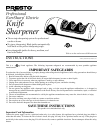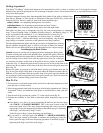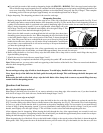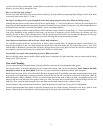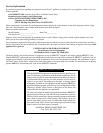you will need to lift up on the handle. Certain blades may not have a curve and therefore it will not be necessary to lift up on the
handle as you draw the tip through the slots.
How can I tell if my knife is sharp?
Use it to slice food. If the knife does not slice the food with ease, it needs additional sharpening. Repeat Stages 2 and 3. If the knife
is extremely dull, repeat stages 1, 2, and 3.
My knife is not sharp and I’ve gone through the whole knife sharpening procedure twice. What am I doing wrong?
Although unusual, there are times when you will have to repeat Stages 1, 2, and 3 more than once. This may occur during the first
sharpening of a knife that has been improperly sharpened by another process previously. It may also occur when sharpening knives
of tempered steel which have extremely hard blades, such as some hunting knives.
To sharpen these types of knives with the Presto
knife sharpener, simply continue to repeat Stages 1, 2, and 3 until the knife cuts
food easily. Depending on the condition of the blade, you may have to repeat the process several times. (In extreme cases, this
could be 10 times or more.) This extended process will only be necessary the first time you use the knife sharpener for this type
of knife. Thereafter, you will be able to sharpen your knife following the normal sharpening procedure.
Can I sharpen serrated knives with my Presto
electric knife sharpener?
Yes, with the exception of electric serrated knives or knives serrated on both sides. To sharpen non-electric serrated knives, use
only the slots in Stages 2 and 3 and only sharpen the smooth side of the knife blade (the side without the grooves). Note: Each
time the knife is sharpened, a portion of the serration is being removed. Over a long period of time, the serration on the knife may
be completely removed and you may have a knife blade similar to a utility knife.
Occasionally I see sparks when sharpening my knives. What causes this?
Knives with high carbon content (usually higher quality knives) sometimes will spark when they come in contact with the sharp-
ening wheels. This is normal.
Care and Cleaning
Always unplug the knife sharpener before cleaning and before removing the interchangeable blade guides.
The outside surface of the knife sharpener may be cleaned with a damp cloth. Do not use abrasives. Never immerse the knife
sharpener in water or any other liquid. Do not use any type of lubrication with the EverSharp
knife sharpener.
Metal filings from your knives will collect inside the knife sharpener base. Occasionally remove the interchangeable blade guide
by grasping it with both hands, placing your thumbs above the lip (Fig. D) and your fingers on the back of the guide where the
blade descriptions (Heavy, Medium, or Fine) are printed. Push down on the front of the guide with your thumbs and use your
fingers to lift and rotate the back of the guide towards you. That will release the two back hooks. Continue lifting to free the two
front tabs. Then, invert the knife sharpener base, and shake out the metal filings that have collected inside.
Any maintenance, other than the items listed here, should be performed by the Presto Factory Service Department.
Stack the interchangeable blade guides on the knife sharpener base for compact storage. Stack them so the heavy guide is at the
bottom, followed by the medium guide, and then the fine guide. Wrap the cord around them so they stay in place.
4



